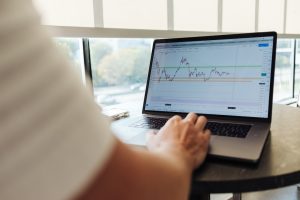Forex, short for foreign exchange, is the largest decentralized financial market in the world, with trades reaching up to $5.3 trillion per day. It involves the buying and selling of currencies, with the aim of making a profit from the changes in their values. While it can be a highly profitable venture, it also comes with its own risks and challenges. In this article, we will explore how to make money on forex.
Understanding the Basics of Forex Trading
To make money on forex, it is important to understand the basics of forex trading. The first step is to choose a currency pair to trade. Currency pairs are two currencies that are paired together, and their values are compared to each other. For example, the EUR/USD pair compares the Euro to the US Dollar.
Forex trading involves buying one currency while selling another. Traders buy a currency when they believe its value will increase in the future, and sell it when they believe its value will decrease. This means that traders can make money both when prices rise or fall.
The forex market is highly volatile, and prices can change rapidly. Traders use various tools and strategies to analyze the market and make informed decisions. Technical analysis involves studying charts and graphs to identify patterns and trends, while fundamental analysis involves analyzing economic and political events that can affect currency values.
Making Money on Forex
There are various ways to make money on forex, and traders can choose the approach that best suits their goals and preferences. Here are some common strategies:
1. Day Trading
Day trading involves buying and selling currencies within a single trading day. Traders aim to profit from small price movements, and often use leverage to amplify their gains. Day trading requires a high level of discipline and risk management, as traders must be able to make quick decisions and manage their emotions.
2. Swing Trading
Swing trading involves holding positions for several days to weeks, and profiting from larger price movements. Traders use technical analysis to identify trends and trade in the direction of the trend. Swing trading requires less time and attention than day trading, but still requires discipline and risk management.
3. Position Trading
Position trading involves holding positions for weeks to months, and profiting from long-term trends. Traders use fundamental analysis to identify trends and trade in the direction of the trend. Position trading requires patience and a long-term perspective, and is suitable for traders who prefer a more relaxed approach.
4. Automated Trading
Automated trading involves using software programs to execute trades automatically, based on pre-determined rules and criteria. Automated trading can be useful for traders who want to take emotions out of the equation and rely on data-driven decisions. However, it requires technical knowledge and careful monitoring.
Managing Risks
Forex trading comes with its own risks and challenges, and it is important to manage these risks to avoid losing money. Here are some risk management strategies:
1. Use Stop Loss Orders
Stop loss orders allow traders to set a limit on their losses. If the market moves against them, the trade is automatically closed at a predetermined price. This helps to limit losses and protect capital.
2. Use Proper Leverage
Leverage allows traders to control larger positions with a smaller amount of capital. However, using too much leverage can lead to large losses. Traders should use proper leverage and avoid overextending themselves.
3. Use Proper Position Sizing
Position sizing refers to the amount of capital allocated to each trade. Traders should use proper position sizing to avoid risking too much of their capital on a single trade.
4. Use Risk-Reward Ratios
Risk-reward ratios refer to the ratio of potential profits to potential losses. Traders should aim for a high risk-reward ratio to ensure that potential profits outweigh potential losses.
Conclusion
Forex trading can be a highly profitable venture, but it requires knowledge, discipline, and risk management. Traders can choose from various strategies and approaches, depending on their goals and preferences. By understanding the basics of forex trading and managing risks effectively, traders can make money on forex and achieve their financial goals.





